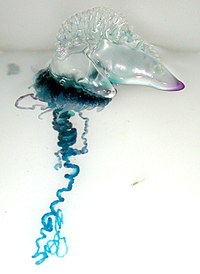
Photo from wikipedia
Collision checking is the primitive operation of motion planning that consumes most time. Machine learning algorithms have proven to accelerate collision checking. We propose CollisionGP, a Gaussian process-based algorithm for… Click to show full abstract
Collision checking is the primitive operation of motion planning that consumes most time. Machine learning algorithms have proven to accelerate collision checking. We propose CollisionGP, a Gaussian process-based algorithm for modeling a robot's configuration space and query collision checks. CollisionGP introduces a Pòlya-Gamma auxiliary variable for each data point in the training set to allow classification inference to be done exactly with a closed-form expression. Gaussian processes provide a distribution as the output, obtaining a mean and variance for the collision check. The obtained variance is processed to reduce false negatives (FN). We demonstrate that CollisionGP can use GPU acceleration to process collision checks for thousands of configurations much faster than traditional collision detection libraries. Furthermore, we obtain better accuracy, TPR and TNR results than state-of-the-art learning-based algorithms using less support points, thus making our proposed method more sparse.
Journal Title: IEEE Robotics and Automation Letters
Year Published: 2023
Link to full text (if available)
Share on Social Media: Sign Up to like & get
recommendations!